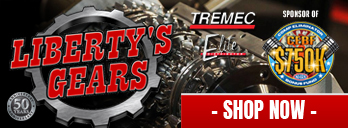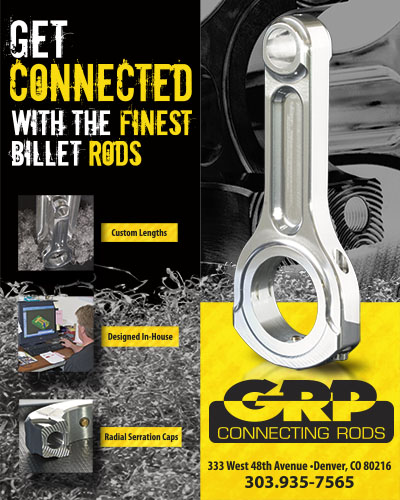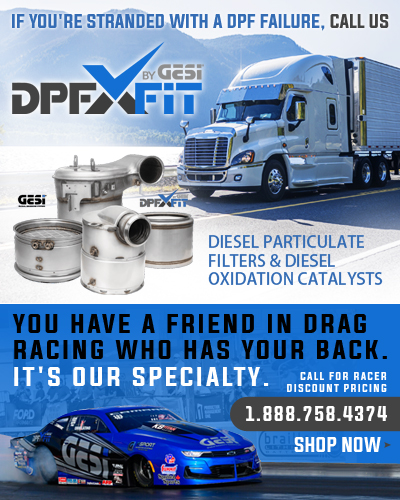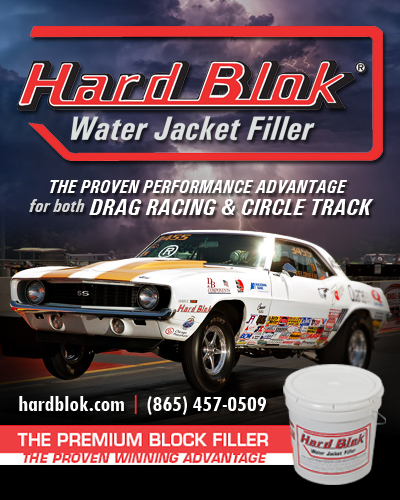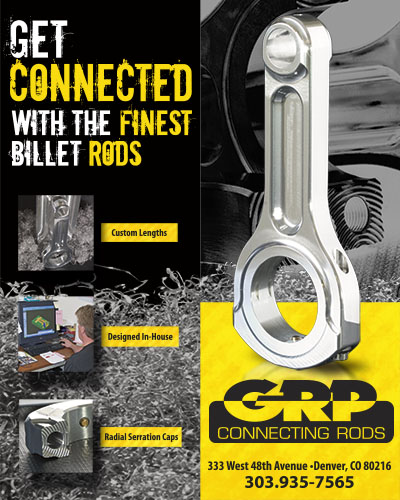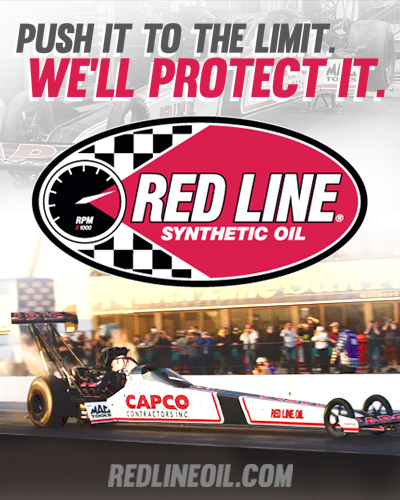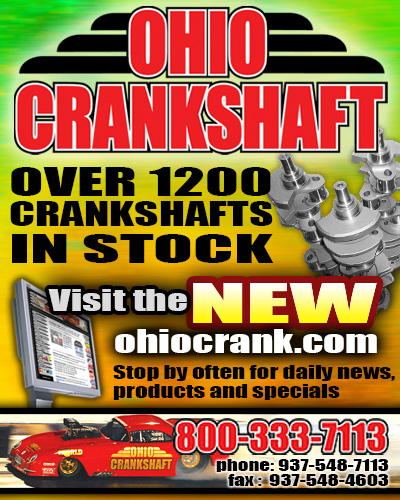SPORTSMAN RACERS TO NHRA: THERE'S DEFINITELY A DISCONNECT
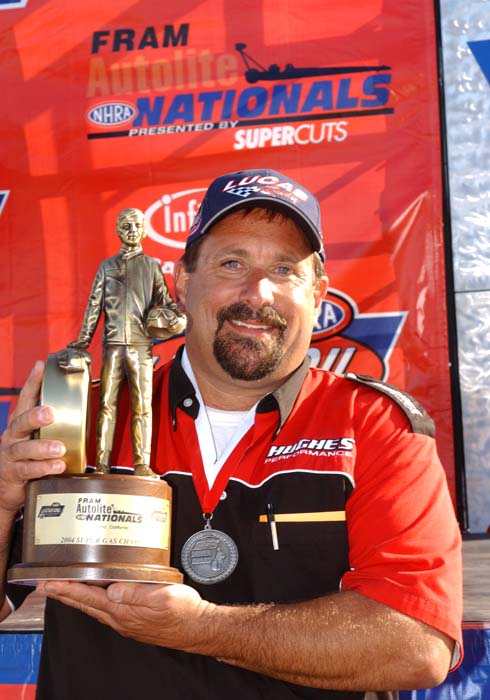
The recent death of a sportsman racer and the cancellation of sportsman racing at a recent NHRA national event have likewise kept many sportsman message boards ablaze with criticism and disdain.
The recurring point these posts make is the disconnect between the NHRA and its sportsman racers gets wider and wider with each subsequent unpopular decision.
John DiBartolomeo is in a unique position as a sportsman racer of 40 years and presently edits Drag Racing Action magazine. He doesn’t think the disconnect between the sportsman racer and the NHRA has gotten any worse, nor does he believe it’s gotten any better.
“When you talk to the average sportsman racer – they don’t have a good feeling about NHRA,” DiBartolomeo said he regretfully admits. “They always feel as if the NHRA is trying to put one over on them. Sometimes they’re right sometimes they’re wrong. Sometimes racers don’t seem to want to hear the other side of the story either. For the most part I think what’s happening is that the sportsman racers are going into an NHRA race already knowing that the NHRA has two strikes against them and it doesn’t take very much to push them over the edge.”
Jim Hughes, owner of Hughes Performance and a fixture amongst his sportsman racing peers, isn’t over the edge angry at the NHRA but believes the sanctioning body should listen to what their sportsman racers are trying to tell them.
“I could sit down for a day to a week, discussing my feelings,” added Hughes, who in addition to racing has been an NHRA sponsor for two decades. “It’s gone from bad to worse.”
Up until now Hughes said he hasn’t been vocal about what has transpired, choosing instead to let his actions speak louder than words. The day before Super Gas racer Derek Sanchez suffered critical injuries he later succumbed to in a crash at the SummitRacing.com NHRA Nationals in Las Vegas, Hughes instructed his own team to load up their cars and leave, in order to race in the NHRA Unleashed Series promoted by NMCA West.
Hughes remained in Vegas to attend to his customers.
“I’ve been a sponsor of the NHRA for over twenty years and the platform has definitely helped brand our company,” said Hughes. “It’s helped grow our business and I’ve met a lot of friends. We’ve been able to win both national and divisional championships. This sport has been very good to us.”
The decision to send his team elsewhere was purely personal. Hughes said he wasn’t willing to gamble his son’s well-being on a questionable track. Joey Hughes is no novice as he’s a past Junior Dragster champion who pilots a 180-mph Super Comp dragster like a seasoned veteran.
“He’s focused, and a phenomenal driver, but I wasn’t willing to sacrifice the potential of him crashing or worse, losing his life,” Hughes explained. “I just couldn’t put him down a track I felt would be prepped marginal at best for a sportsman car. I don’t know any better way to put it. This is no disrespect to the track crew as I know they are just following the orders given them.
“I wasn’t looking to be a Pied Piper or asking anyone to follow me. I was just doing what was best for my team.”
Hughes said to this date only fellow racers have contacted him and no one from NHRA, just another example of the disconnect many see and some deny.
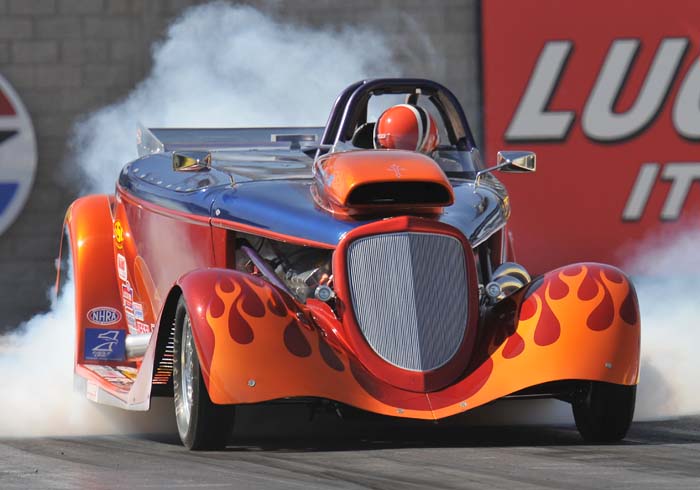
“The same track prep they use for a pro car isn’t necessarily what is conducive for a sportsman car,” added Hughes.
Hughes believes the unglamorous life of a sportsman racer is apparent simply by looking at the schedule.
“If you’re a sportsman racer, you are up at 7 AM preparing to run that morning,” Hughes said. “We usually either run a time run or two rounds of eliminations by 10 AM. Then we shut down for the entire day. Then we don’t run again until 6, 7 or 8 o’clock at night. The schedule is always tailored around getting the pro sessions in.”
Hughes points out after the fans have left, he and his fellow racers take to a track which he feels has been stripped of its original rubber then over-sprayed, rosined, drug and with all the remnants the pro and alcohol classes have left behind.
“What we get is a track where there’s clutch dust which can no longer be brushed off,” said Hughes. “There is so much material, in my opinion, spray and glue which has been put on the track to where we get a sticky but gooey surface.”
Hughes says venues such as Vegas present a unique set of circumstances the NHRA should take into consideration. This consideration should be extended at venues where the dew-point hits while racing is being conducted.
“When the sun goes down in Vegas, you have a lot of wind that blows dust on the track and you have the compound already there and I wasn’t willing to send my son down a track like that and risk his life,” Hughes explained. “Before that event I had made the comment time and time again, they [NHRA] was going to send someone down a track like this until someone gets hurt, or worst yet, killed.
“Derek Sanchez was part of our sportsman family and for him to get killed, I cannot and won’t accept it. It shouldn’t have happened. Here we are as sportsman racers worried about what happened at the Houston race and points, and if you ask me, we are concerned about the wrong issues. We should be thinking about Derek Sanchez’ life was cancelled due to a race track which was not properly prepared to send a sportsman car down the track. Every event this year [up until Houston] has ended with a sportsman car crashing or getting loose and hitting the wall at night.”
Hughes believes when there are cars pulling out of line during eliminations for safety reasons there is a problem the NHRA cannot continue to ignore. He said he has witnessed this at two events this season already yet the race continues on.
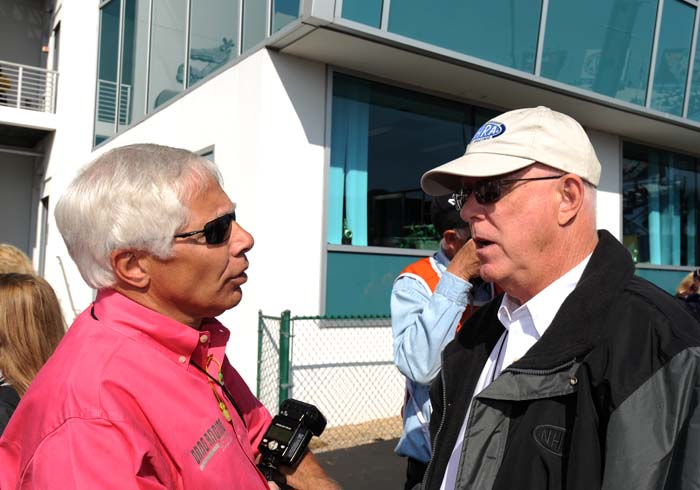
DiBartolomeo believes many times in night races the conditions get treacherous. Last season during the NHRA Gatornationals, he stuffed his Super Comp dragster into the wall well after the professional show had ended.
“I don’t think they put as much emphasis on the sportsman racer as they should,” DiBartolomeo said. “You know racers got a bad rap years ago when we were called participants. Well, we’re really customers. I mean it’s no different than you or I going into a restaurant, and plunking down fifty bucks for the best steak in the house. I’m a customer. I think somewhere along the line they need to treat racer a little bit better maybe, and I don’t know if that’s the total answer. The track prep deal I think is slightly different, I certainly would like to discuss this issue with them more because the feeling amongst the pits is that “they” don’t care about the sportsman. That’s a pretty harsh thing to say and I’m not sure that’s correct, or at least I don’t want to think like that, but I have to say that there are times when a racer can feel that way. I don’t think it’s a case of them not caring.”
Currently the NHRA must prep the track for two different styles of professional race vehicle racing two different lengths. Once professional qualifying is completed, the NHRA does a measure of grooming work for the remaining sportsman divisions.
Hughes understands the NHRA needs to cater to their race fans through the professional divisions but on the same token believes it’s unfair for the sportsman to wait all day to race and then do so on a track unprepared for their race vehicles. He wonders if the time has come to separate the professional and sportsman racers at the national events.
“They should be pro only because of the track prep that is needed for them to get down the track,” admitted Hughes. “They should bring in monster trucks and wheel-standers as filler. Bring something in to put on a show for the spectators. That’s what they are there for, to see a show. They aren’t there to watch Super Gas or Super Comp.”
Three times a year the NHRA fields sportsman only national events backed by Jegs. Hughes believes this might be a viable alternative which helps both the sanctioning body and its sportsman racers.
“A sportsman national event is the standard for which all sportsman events should be run,” said Hughes. “You have everything from a bracket program to Comp eliminator. That produces a safe racing environment for sportsman racing cars, 600 – 800 entries, and what you have is basically a national event for the sportsman racers. There are very few incidents.”
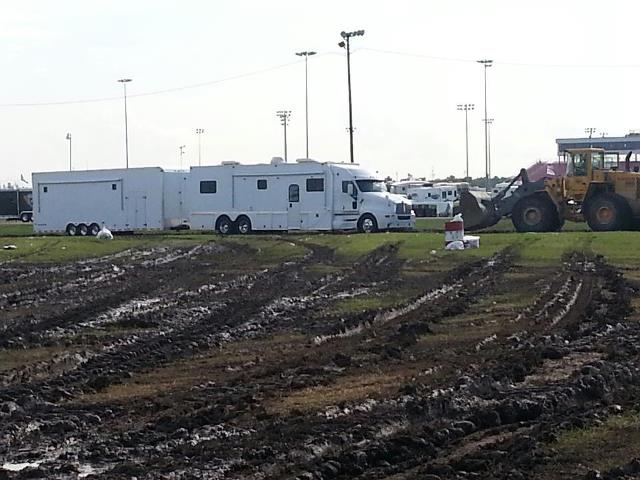 A sportsman-only national event, some sportsman racers say, would go a long way towards preventing a repeat of Houston, where the sportsman portion was simply cancelled and entry fees refunded. While DiBartolomeo understands Hughes reasoning, he believes a clear divorce of NHRA from sportsman racing might be too much for the sport.
A sportsman-only national event, some sportsman racers say, would go a long way towards preventing a repeat of Houston, where the sportsman portion was simply cancelled and entry fees refunded. While DiBartolomeo understands Hughes reasoning, he believes a clear divorce of NHRA from sportsman racing might be too much for the sport.
“I used to think they should dump sportsman cars from every national event but I think that’s a little drastic. I think there are still some national events that warrant having sportsman cars. I was told years and years ago that Wally’s vision was that a national event would be a giant car club. A giant gathering of car guys hanging out, just cars, show their cars, race their cars, so on and so forth. And that’s pretty admirable but I think we’re past that point right now,
“I think NHRA needs to look at national events a little bit differently. There are certain national events that don’t warrant having sportsman cars there. We have time constraints, we’ve got low attendance so to speak, sportsman wise. That needs to be addressed. Somewhere along the line that somebody’s got to ask that question.”
And the real question both racers ask; is simply, who do you ask? The Sportsman Racers Advisory Council is limited in their ability to represent the sportsman racers.
“I kinda thought that that was something that needed to be done a long, long, long time ago,” DiBartolomeo said. “And then when it came about I thought ‘this is perfect’.
“Now the council has been able to get some things done in the Super Stock and Stock classes with indexes and rules and things like that. In Super category there aren’t a lot of things to talk about as far as rules or anything like that is concerned. We did put a motion in that we did want the indexes dropped, but that didn’t fly. We tried hard to get the dual brake systems legalized and it took the efforts of more than just the council to get that passed. But they have this advisory council and I’m just not sure how good it works.”
In a way, Hughes wouldn’t mind if the sanctioning body made the decision for them to race there or not.
“If NHRA decided there would be no sportsman racing, then it would be a blessing because then we could make a decision and go race another venue,” Hughes explained. “We, the sportsmen, will not quit racing. Drag racing is here to stay. I think that the foundation that Wally Parks had originally built, a safe racing environment for his friends and family to compete, no longer is NHRA’s motive for the sportsman racer. Back in the day when Wally brought out the gassers and the nine, ten and eleven second cars – that was his vision. The sport has changed so much. The industry needs the next Wally Parks.”
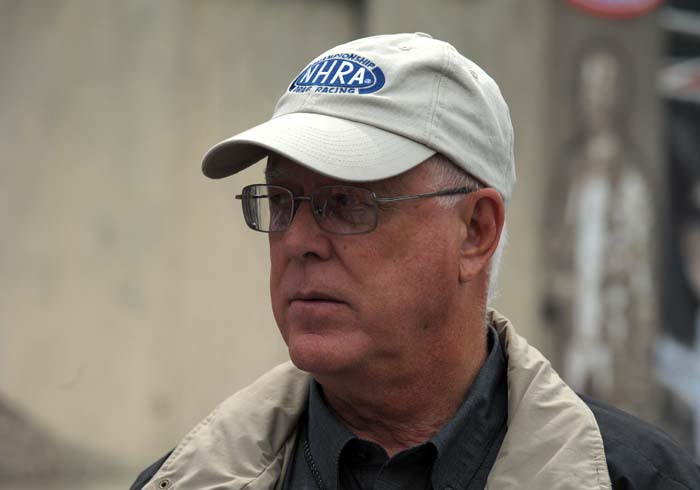
“It troubles me they would feel that way, we invest a tremendous amount of money in sportsman racing and I’m not complaining about that,” Light pointed out. “I mean I’m glad we do and we always will. But we’ve got a lot of our people that are focused solely on sportsman racing. For instance the seven division directors and their staff, 95% of what they do is sportsman related. The divisional points races, national opens, the Super Quick series.”
“The Junior programs, everything they do -- is sportsman related and that’s their jobs. We’ve got field offices all the way around the country doing that. We have a field marketing division with Eric Lotz and his group, all they do is support the divisional sportsman activities. Whether it be the Sports National or the divisional points races or the Summit ET championship and so on.
“We’ve got a tech department that the majority of the people working in the tech department are working on sportsman rules and regulations and meeting with manufactures and racing groups and so on. We set up a few years ago the sportsman racer advisory council which has been tremendous feedback for us and we appreciate the efforts of all those, the representatives on those councils I think we are connected.”
While Hughes might not necessarily agree at the moment, he’s more than willing to bring a number of the concerns to the table if the NHRA’s hierarchy is willing to have a constructive dialogue.
“I would love to get input on what does a sportsman racer want from the NHRA, and I’d be willing to go to bat for them,” said Hughes. “Maybe compile a list of concerns and sit down with Graham Light, Peter Clifford and Tom Compton to see what our options are.”
And for Hughes, he wants to see the NHRA succeed in their efforts.
“I am a huge fan of the NHRA’s pros,” Hughes said. “Some of the pro drivers are my best friends. I wish and hope the NHRA continues to put on a great show to compete with NASCAR and professional rodeo and any other venue fighting for entertainment dollars.”
Hughes would just like to feel more connected to the NHRA as a sportsman racer all the while seeing the sanctioning body succeed.

